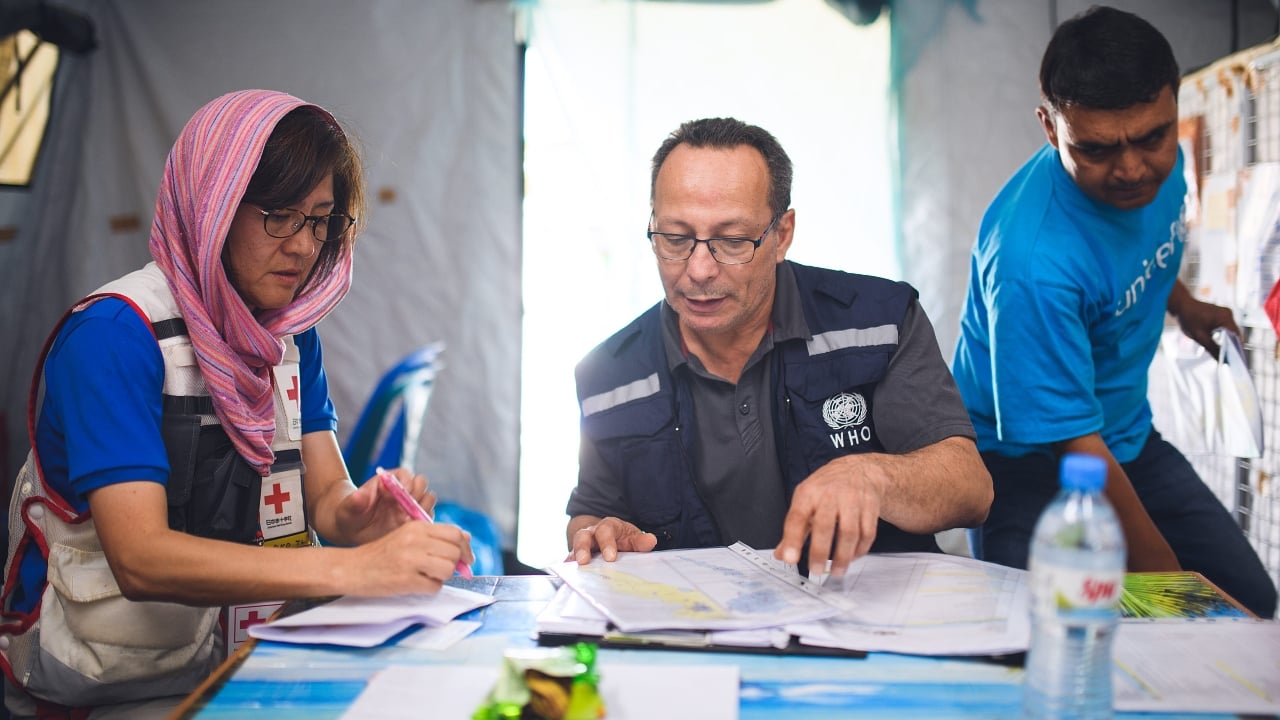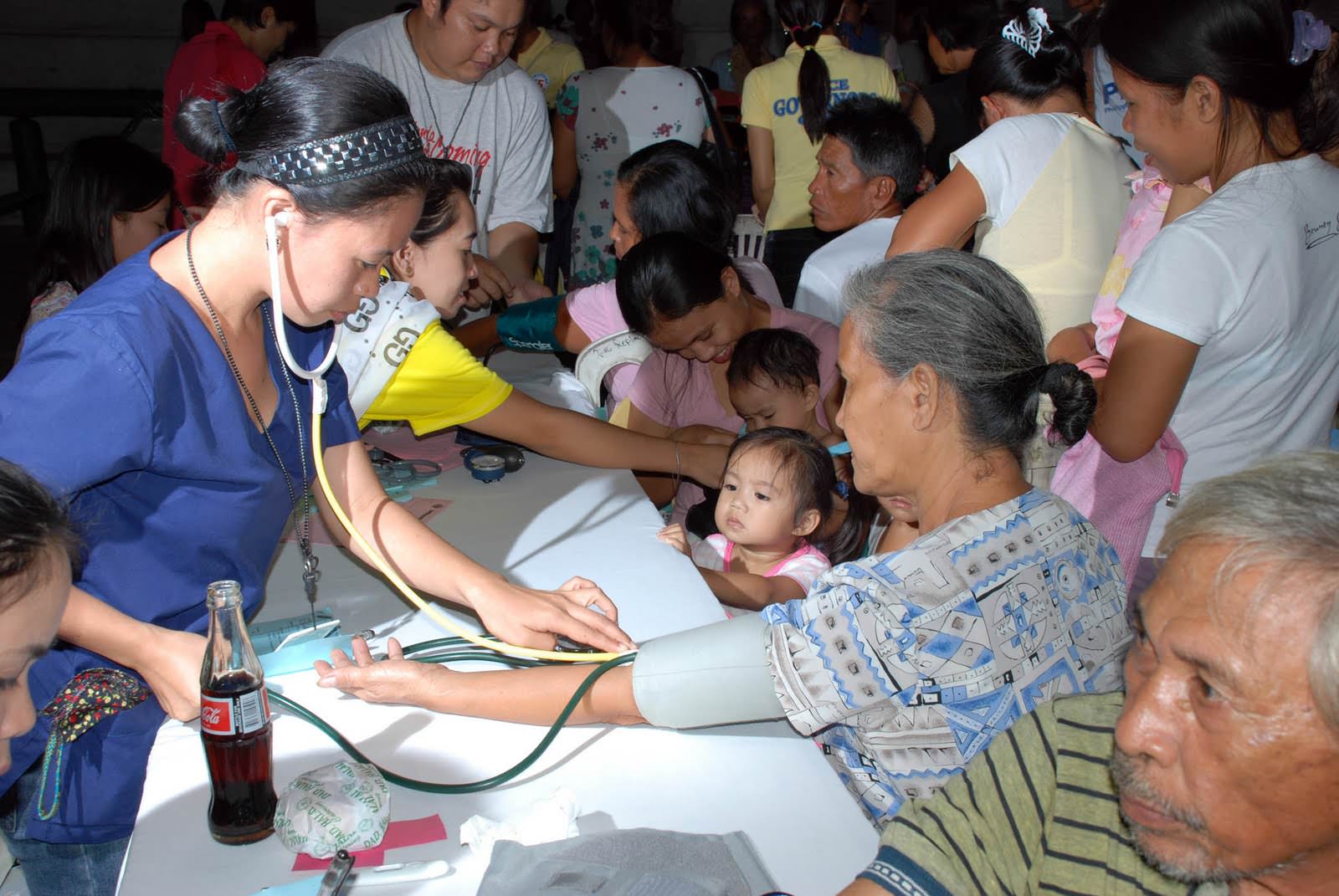

Featured
What To Do With A Public Health Degree
Modified: May 22, 2024
Discover the top career paths and job opportunities for those with a public health degree. Featured articles on public health professions and salary potential.
Introduction
Welcome to the exciting field of public health! If you have a passion for promoting well-being, preventing diseases, and making a positive impact on communities, pursuing a degree in public health can open up a world of opportunities for you. Public health is a multidisciplinary field that focuses on protecting and improving the health of populations through research, education, and public policy.
In this article, we will explore the various career paths and job opportunities available to individuals with a public health degree. Whether you’re interested in healthcare administration, epidemiology, global health, public health research and policy, nonprofit and community health organizations, public health consulting, or academic and teaching positions, there’s a path for you in the field of public health.
Public health professionals play a vital role in addressing major health challenges, such as infectious diseases, chronic illnesses, environmental hazards, and health disparities. They work collaboratively with government agencies, healthcare organizations, community groups, and researchers to develop and implement strategies to improve the health and well-being of communities.
Having a public health degree equips you with the knowledge and skills necessary to assess and respond to public health issues at both the individual and population levels. This includes understanding the social determinants of health, conducting epidemiological investigations, designing and evaluating health promotion programs, advocating for health policies and regulations, and engaging in community outreach and education.
By choosing a career in public health, you can make a meaningful difference in the lives of others and contribute to creating healthier populations. Whether you’re interested in preventing the spread of diseases, addressing health disparities, promoting healthy lifestyles, or advocating for healthcare policies, there’s no shortage of opportunities to apply your public health expertise.
So, if you’re ready to embark on a rewarding journey in public health, keep reading to explore the diverse career paths that await you. Whether you’re a recent graduate or considering a career change, a public health degree can open doors to a wide range of fulfilling and impactful career opportunities.
Overview of Public Health Degree
A public health degree provides a comprehensive and interdisciplinary education that equips graduates with the knowledge and skills to address public health challenges on a local, national, and global scale. Whether you pursue a bachelor’s, master’s, or doctoral degree in public health, you will develop a strong foundation in core public health concepts and gain specialized expertise in a particular area of interest.
The curriculum of a public health degree program typically covers a wide range of topics, including epidemiology, biostatistics, environmental health, health policy and management, social and behavioral sciences, and global health. Students learn how to assess community health needs, design and implement interventions, conduct research, and evaluate the effectiveness of public health programs.
Public health degree programs often incorporate practical experiences, such as internships, fieldwork, and research projects, which provide students with hands-on learning opportunities and real-world exposure to public health practice. These experiences allow students to apply their knowledge in a practical setting and develop essential skills in data analysis, program planning, communication, and leadership.
One of the key features of a public health degree is its emphasis on collaboration and interdisciplinary approaches. Public health professionals often work in multidisciplinary teams, bringing together individuals from various fields, such as medicine, nursing, epidemiology, biostatistics, social sciences, environmental sciences, and policy. This collaborative approach enables a comprehensive understanding of health issues and fosters the development of innovative and effective solutions.
Depending on the level of degree pursued, graduates of public health programs can pursue a variety of career paths. A bachelor’s degree in public health can provide a solid foundation for entry-level positions in public health agencies, community health organizations, and healthcare settings. It can also serve as a stepping stone to further education in a specialized area of public health.
Master’s and doctoral degrees in public health offer greater specialization and expertise in specific areas of public health. Graduates with a master’s degree often work in leadership and management roles in public health agencies, nonprofit organizations, research institutions, and healthcare settings. They may also pursue careers in academia or public health consulting.
Ultimately, a public health degree prepares graduates for a dynamic and rewarding career focused on improving the health and well-being of communities. Whether you’re interested in preventing diseases, promoting healthy behaviors, advocating for health equity, or shaping public health policies, a public health degree can provide you with the knowledge, skills, and opportunities to make a meaningful impact in the field of public health.
Job Opportunities in Public Health
There is a wide range of job opportunities available for individuals with a public health degree. The field of public health offers diverse and fulfilling career paths that allow professionals to make a positive impact on the health and well-being of communities. Whether you are interested in working directly with individuals or influencing public health policies, here are some of the job opportunities you can explore:
1. Healthcare Administration:
Public health professionals with strong leadership and management skills can pursue careers in healthcare administration. These roles involve overseeing healthcare facilities, managing budgets, implementing policies, and ensuring efficient and effective delivery of healthcare services. Healthcare administrators play a vital role in improving the overall quality and accessibility of healthcare for individuals and communities.
2. Epidemiology:
Epidemiologists study patterns and causes of diseases in populations. They investigate outbreaks, collect and analyze data, and develop intervention strategies to control the spread of infectious diseases. Epidemiologists also play a crucial role in monitoring and responding to public health crises, such as pandemics and natural disasters. Careers in epidemiology can be found in government agencies, research institutions, and healthcare organizations.
3. Global Health:
Public health professionals interested in making a global impact can work in the field of global health. These roles involve addressing health issues on an international scale, such as infectious diseases, maternal and child health, and access to healthcare in low-resource settings. Global health professionals may work for international organizations, non-governmental organizations (NGOs), or government agencies to improve health outcomes and reduce health disparities worldwide.
4. Public Health Research and Policy:
Public health researchers play a critical role in generating evidence-based knowledge to inform public health policies and interventions. They design and conduct studies, analyze data, and disseminate research findings to promote evidence-based practices. Public health policy professionals, on the other hand, work on developing and implementing policies that address public health concerns, such as smoking regulations, vaccination campaigns, and food safety guidelines.
5. Nonprofit and Community Health Organizations:
Nonprofit organizations and community health organizations focus on delivering healthcare and preventive services to underserved populations. Public health professionals can work for these organizations to develop and implement programs that address specific health needs within communities, such as health education, disease prevention, and access to healthcare services. These roles often involve community engagement, collaboration with stakeholders, and advocating for health equity.
6. Public Health Consulting:
Public health consultants provide expertise and guidance to organizations and agencies seeking to improve their public health initiatives. They offer strategic advice, conduct program evaluations, and assist with policy development. Public health consultants may work independently or as part of consulting firms, assisting clients in various sectors, including healthcare, government, and non-profit organizations.
7. Academic and Teaching Positions:
For those interested in education and research, pursuing academic and teaching positions in public health can be a rewarding career path. Public health educators are responsible for developing and delivering courses, conducting research, and mentoring the next generation of public health professionals. Academic positions can be found in universities, research institutions, and public health schools.
These are just a few examples of the job opportunities available in the field of public health. The diverse nature of public health allows professionals to find a career path that aligns with their interests and passions. By choosing a career in public health, you can have a meaningful and lasting impact on the health and well-being of individuals and communities.
Careers in Healthcare Administration
If you have a passion for both healthcare and leadership, a career in healthcare administration may be the perfect fit for you. Healthcare administrators play a crucial role in managing and improving the delivery of healthcare services, ensuring the efficient operation of healthcare facilities, and shaping healthcare policies to meet the needs of patients and communities. With a public health degree, you can pursue various career pathways within healthcare administration:
1. Hospital Administrator:
As a hospital administrator, you would be responsible for overseeing the day-to-day operations of a hospital or healthcare facility. This includes managing budgets, coordinating departmental activities, ensuring quality standards are met, and collaborating with healthcare professionals to enhance patient care. Hospital administrators play a vital role in creating a positive healthcare experience for patients and optimizing the efficiency of healthcare services.
2. Healthcare Manager:
Healthcare managers work in a variety of settings, such as clinics, nursing homes, outpatient centers, and public health agencies. They are responsible for planning and coordinating healthcare services, managing staff, implementing policies and regulations, and ensuring compliance with healthcare laws and industry standards. Healthcare managers are essential in maintaining the smooth functioning of healthcare organizations and providing quality care to patients.
3. Health Information Manager:
As a health information manager, you would be responsible for managing and safeguarding patient health records, electronic health data, and medical information systems. This includes ensuring the accuracy and confidentiality of health records, implementing data security measures, and overseeing the use of electronic health record systems. Health information managers play a critical role in organizing and maintaining health data to support effective decision-making and improve patient outcomes.
4. Healthcare Policy Analyst:
Healthcare policy analysts work at the intersection of public health and policymaking. They analyze healthcare policies and regulations, stay informed about changes in healthcare legislation, and assess the impact of policy decisions on healthcare delivery and patient outcomes. Healthcare policy analysts provide valuable insights and recommendations to policymakers to improve the accessibility, quality, and affordability of healthcare services for individuals and communities.
5. Healthcare Consultant:
Healthcare consultants work with healthcare organizations to identify and address operational challenges, improve efficiency, and implement strategic initiatives. They provide expertise and guidance in areas such as healthcare management, financial analysis, process improvement, and quality assurance. Healthcare consultants play a pivotal role in assisting healthcare organizations to optimize resources, enhance patient care, and achieve sustainable growth.
Careers in healthcare administration offer a unique blend of healthcare expertise, leadership skills, and business acumen. With a public health degree, you will have a solid foundation in public health principles, enabling you to understand the broader context of healthcare and approach administrative challenges from a population health perspective. Healthcare administrators have the opportunity to make a tangible impact on healthcare delivery, shape organizational strategies, and advocate for policies that prioritize patient-centered care and improve health outcomes.
Whether you choose to work in a hospital, public health agency, government organization, or consulting firm, a career in healthcare administration allows you to contribute to the efficient and effective management of healthcare services, ensuring that patients receive the quality care they deserve. By combining your passion for improving health outcomes with your skills in administration and leadership, you can play a vital role in shaping the future of healthcare.
Roles in Epidemiology
Epidemiology is a critical field within public health that focuses on studying the patterns, causes, and impacts of diseases in populations. Epidemiologists play a vital role in preventing and controlling the spread of diseases, improving public health policies, and guiding evidence-based interventions. If you have a passion for data analysis, research, and public health impact, pursuing a career in epidemiology might be the right fit for you. Here are some of the key roles within epidemiology:
1. Outbreak Investigator:
Outbreak investigators are on the front lines during disease outbreaks, working to identify the source of the outbreak, track the spread of the disease, and implement control measures. These epidemiologists collect and analyze data, conduct interviews, and collaborate with healthcare providers and public health agencies to prevent further transmission and protect the public’s health.
2. Research Epidemiologist:
Research epidemiologists design and conduct studies to investigate the causes and risk factors of diseases. They collect and analyze data, develop research protocols, and publish their findings in scientific journals. Research epidemiologists contribute to the body of knowledge in the field, guiding public health policies and interventions, and advancing our understanding of diseases and their prevention.
3. Infectious Disease Epidemiologist:
Infectious disease epidemiologists specialize in studying and managing communicable diseases, such as influenza, tuberculosis, HIV/AIDS, and COVID-19. They monitor disease trends, conduct surveillance activities, and develop strategies to prevent and control the spread of infectious diseases. Infectious disease epidemiologists often collaborate closely with healthcare providers, laboratories, and public health agencies to respond to outbreaks and protect population health.
4. Environmental Epidemiologist:
Environmental epidemiologists investigate the impact of environmental factors, such as air pollution, water contamination, and occupational hazards, on human health. They study the association between environmental exposures and the development of diseases, assess risks, and provide evidence for policy and intervention strategies to reduce environmental health risks. Environmental epidemiologists contribute to creating healthy and sustainable environments for communities.
5. Cancer Epidemiologist:
Cancer epidemiologists focus on understanding and preventing cancer through studying its incidence, risk factors, and outcomes. They analyze data, conduct epidemiological research, and collaborate with healthcare professionals to develop prevention and control strategies. Cancer epidemiologists play a critical role in identifying cancer trends, implementing screening programs, and advocating for policies that support cancer prevention and early detection.
6. Occupational Epidemiologist:
Occupational epidemiologists study the relationship between work environments and workers’ health outcomes. They investigate occupational hazards and assess their impact on workers’ health, safety, and well-being. Occupational epidemiologists play a key role in developing interventions and policies to protect workers from workplace-related hazards, reduce occupational injuries and illnesses, and promote a safe and healthy work environment.
Epidemiologists work in a variety of settings, including government agencies, research institutions, hospitals, academia, and non-profit organizations. They collaborate with other public health professionals, healthcare providers, policymakers, and community organizations to address public health challenges and improve population health outcomes.
By pursuing a career in epidemiology, you will have the opportunity to make a significant impact on public health by identifying the causes of diseases, developing prevention strategies, and guiding evidence-based interventions. As an epidemiologist, your work will contribute to improving health outcomes, informing public health policies, and ultimately, saving lives.
Opportunities in Global Health
Global health is a field that addresses health issues on a global scale, with a focus on improving health outcomes and reducing health disparities in low- and middle-income countries. It requires an understanding of the social, economic, and political factors that impact health and a commitment to promoting health equity worldwide. If you’re passionate about making a difference in the lives of people around the globe, a career in global health may be the right path for you. Here are some of the opportunities available in global health:
1. Global Health Program Manager:
As a global health program manager, you would oversee and coordinate international health programs and projects. This role involves managing budgets, collaborating with partner organizations, monitoring program implementation, and evaluating program impact. Global health program managers play a crucial role in ensuring the successful delivery of healthcare services and interventions in resource-limited settings.
2. Public Health Advisor:
Public health advisors work in international organizations, non-governmental organizations (NGOs), and government agencies to provide technical expertise and guidance on public health issues. They may focus on specific areas such as maternal and child health, infectious diseases, or health system strengthening. Public health advisors are responsible for developing strategies, conducting assessments, and providing recommendations to improve health outcomes in different global contexts.
3. Global Health Researcher:
Global health researchers conduct studies and research projects to generate knowledge that can inform global health policies and interventions. They may investigate health disparities, evaluate the effectiveness of interventions, and study the impact of social and environmental factors on health outcomes. Global health researchers play a critical role in advancing our understanding of complex health challenges and identifying innovative solutions.
4. Health Program Evaluator:
Health program evaluators assess the effectiveness and impact of global health programs and interventions. They design and implement evaluation plans, collect and analyze data, and provide evidence-based recommendations for program improvement. Health program evaluators play a crucial role in ensuring that resources are utilized effectively and that programs are achieving desired health outcomes.
5. Global Health Policy Analyst:
Global health policy analysts analyze global health policies and make recommendations for policy changes to address pressing public health challenges. They stay informed about international health policies, collaborate with stakeholders, and advocate for policies that promote equitable access to healthcare, strengthen health systems, and improve health outcomes. Global health policy analysts play a pivotal role in shaping the global health agenda and influencing policy decisions.
6. Disaster Response and Humanitarian Aid:
In times of emergencies and disasters, global health professionals are crucial in providing immediate healthcare services and humanitarian aid. They may work with organizations such as the World Health Organization (WHO), Médecins Sans Frontières (Doctors Without Borders), or other relief agencies to coordinate healthcare interventions, ensure the provision of essential medical care, and support affected communities.
Working in global health provides opportunities to collaborate with diverse populations, immerse yourself in different cultures, and address health challenges that transcend borders. It requires adaptability, cultural sensitivity, and a commitment to social justice. Global health professionals have the opportunity to make a significant impact by improving health outcomes, reducing health disparities, and strengthening health systems in resource-constrained settings.
Whether you work on the ground delivering healthcare services, conduct research to inform policies, or provide technical expertise and guidance, your contributions to global health can have a tangible and lasting impact on communities around the world.
Public Health Research and Policy
Public health research and policy play a crucial role in shaping the strategies, interventions, and regulations that improve population health outcomes. Through evidence-based research and the development of effective policies, public health professionals strive to prevent diseases, promote health equity, and create healthier communities. If you have a passion for generating knowledge and influencing health policies, a career in public health research and policy may be the perfect fit for you. Here are some of the opportunities within this field:
1. Epidemiological Research:
Epidemiological research focuses on identifying patterns, causes, and risk factors of diseases in populations. Epidemiologists design and conduct studies, collect and analyze data, and publish their findings in scientific journals. This research provides valuable insights into the impact of various factors on health outcomes and informs the development of public health interventions and policies.
2. Health Services Research:
Health services research investigates how healthcare is delivered, accessed, and financed. Health services researchers examine factors influencing healthcare quality, cost, and accessibility, including healthcare disparities and patient outcomes. Their findings help shape policies and interventions to improve healthcare delivery, enhance quality of care, and promote health equity.
3. Policy Development and Analysis:
Public health policy professionals analyze existing policies and work to develop new ones that address pressing health challenges. They conduct research, evaluate the impact of current policies, collaborate with stakeholders, and advocate for evidence-based policies that promote public health. Policy professionals also work to ensure that policies are implemented effectively and monitored for their impact on population health.
4. Health Equity Research:
Health equity research focuses on understanding and addressing health disparities and social determinants of health. Researchers investigate the root causes of health disparities, such as socioeconomic factors, access to healthcare, and racial and ethnic disparities. Health equity research contributes to the development of policies and interventions aimed at reducing health inequities and promoting equitable access to healthcare and resources.
5. Program Evaluation:
Program evaluation assesses the effectiveness and impact of public health programs and interventions. Evaluators collect and analyze data to determine whether programs are achieving their desired outcomes, identify areas for improvement, and ensure that resources are being utilized effectively. Program evaluation provides valuable information for policymakers and program managers to make informed decisions and allocate resources efficiently.
6. Health Policy Advocacy:
Health policy advocates work to shape public health agendas and influence policy decisions. They engage in advocacy campaigns, collaborate with policymakers, and raise awareness about public health issues. Health policy advocates play a crucial role in promoting policies that address social determinants of health, advocate for vulnerable populations, and improve the overall health and well-being of communities.
Public health research and policy fields offer a wide range of opportunities to make a significant impact on population health. By conducting research, analyzing data, and developing evidence-based policies, public health professionals help to guide and shape public health initiatives that can improve the lives of individuals and communities. They work in collaboration with government agencies, non-profit organizations, academic institutions, and community groups to develop solutions, advocate for change, and improve health outcomes for all.
Whether you pursue research, policy analysis, or advocacy, a career in public health research and policy allows you to contribute to the development of effective strategies, interventions, and policies that lead to improved public health outcomes and greater health equity.
Nonprofit and Community Health Organizations
Nonprofit and community health organizations are at the forefront of promoting health and well-being within communities. These organizations play a critical role in delivering healthcare services, implementing preventive programs, and addressing health disparities. If you have a passion for community engagement and making a positive impact on people’s lives, a career in nonprofit and community health organizations may be the right fit for you. Here are some of the opportunities within this field:
1. Community Health Worker:
Community health workers (CHWs) are frontline public health professionals who work directly with community members to address their health needs. They provide health education, connect individuals to healthcare resources, conduct health screenings, and advocate for health equity within the community. CHWs play a crucial role in bridging the gap between healthcare services and underserved populations.
2. Health Educator:
Health educators work to promote health literacy and provide education on various health topics within communities. They develop and implement educational programs, conduct workshops and training sessions, and create health promotion materials. Health educators empower individuals and communities to make informed decisions about their health and well-being.
3. Program Coordinator:
Program coordinators oversee the planning, implementation, and evaluation of community health programs. They collaborate with stakeholders, develop program goals and objectives, manage budgets, coordinate logistics, and ensure successful program delivery. Program coordinators play a vital role in ensuring that programs effectively address the health needs of the community and achieve desired outcomes.
4. Nonprofit Executive Director:
Nonprofit executive directors provide strategic leadership and management for nonprofit organizations focused on community health. They oversee the organization’s operations, manage budgets, develop partnerships, and advocate for the organization’s mission. Nonprofit executive directors play a crucial role in advancing the organization’s goals and ensuring its sustainability.
5. Grant Writer:
Grant writers in nonprofit and community health organizations are responsible for securing funding through grant proposals. They research funding opportunities, write grant applications, and develop compelling narratives to effectively demonstrate the need and impact of the organization’s programs. Grant writers play a critical role in securing the resources necessary to support community health initiatives.
6. Policy Advocate:
Policy advocates in nonprofit organizations work to shape public health policies at the local, state, and national levels. They engage in advocacy efforts, build relationships with policymakers, develop policy briefs, and mobilize community members to support policy change. Policy advocates play a crucial role in making sure that policies align with the health needs of the community and promote health equity.
Working in nonprofit and community health organizations allows professionals to have a direct and meaningful impact on the health and well-being of individuals and communities. These organizations prioritize community needs, problem-solving, and advocacy to create sustainable health improvements. Through collaboration with various stakeholders and community members, professionals in nonprofit and community health organizations work toward reducing health disparities, promoting health equity, and improving overall health outcomes.
Whether you work as a CHW, program coordinator, grant writer, or advocate, you have the opportunity to make a positive difference in the lives of individuals and communities. By collaborating with community members, implementing evidence-based interventions, and advocating for equitable healthcare access, you can contribute to empowering communities and improving the health and well-being of those you serve.
Public Health Consulting
Public health consulting offers a unique and dynamic career path for individuals with a passion for solving complex health challenges and providing strategic guidance to organizations. Public health consultants provide expertise, analysis, and recommendations to clients in various sectors, including government agencies, healthcare systems, non-profit organizations, and private companies. If you thrive on problem-solving, collaboration, and making a direct impact on public health initiatives, a career in public health consulting might be the right fit for you. Here are some of the opportunities within this field:
1. Program Evaluation:
Public health consultants conduct program evaluations to assess the effectiveness of public health initiatives. They design evaluation plans, collect and analyze data, and provide recommendations for program improvement. Program evaluations help clients identify strengths and weaknesses in their programs, refine strategies, and maximize the impact of their public health efforts.
2. Policy Analysis and Development:
Public health consultants analyze existing policies and help develop new policies that address public health concerns. They stay up-to-date on the latest research and best practices, conduct policy analysis, and provide recommendations for policy changes or improvements. Policy consultants play a crucial role in shaping public health agendas, advocating for evidence-based policies, and influencing policy decisions at the local, regional, and national levels.
3. Strategic Planning:
Public health consultants assist organizations in developing strategic plans to achieve their public health goals. They facilitate strategic planning processes, conduct needs assessments, analyze data, and provide recommendations for priority-setting and action planning. Strategic planning consultants help clients identify objectives, allocate resources, and create roadmaps for successful implementation of public health initiatives.
4. Data Analysis and Interpretation:
Public health consultants are skilled in quantitative and qualitative data analysis. They analyze health data, interpret findings, and transform complex data into meaningful insights. Consultants use data analysis to identify trends, monitor health indicators, and inform decision-making for clients seeking to improve public health outcomes.
5. Health Communication and Education:
Public health consultants support organizations in developing effective health communication and education strategies. They design health promotion campaigns, write educational materials, and create communication plans to reach diverse audiences. Health communication consultants aim to deliver clear and impactful health messages that promote behavior change and improve health outcomes.
6. Capacity Building and Training:
Public health consultants provide capacity-building support and training for individuals and organizations in public health. They develop training modules, facilitate workshops, and offer technical assistance to enhance skills and knowledge in areas such as program implementation, evaluation, and policy development. Capacity-building consultants help clients build the necessary competencies and resources to successfully address public health challenges.
Public health consulting offers a wealth of opportunities to make a significant impact on public health practice and policy. As a consultant, you have the ability to work with a diverse range of clients and projects, contributing your expertise and helping to drive positive change. Whether you are analyzing data, shaping policies, or providing strategic guidance, public health consultants play a vital role in improving public health outcomes and advancing the field.
By working as a public health consultant, you have the chance to tackle complex health challenges, generate innovative solutions, and facilitate collaboration among stakeholders. Your work can help organizations and communities achieve their public health goals, leading to healthier populations and improved quality of life.
Academic and Teaching Positions
Academic and teaching positions in public health provide an opportunity to make a lasting impact by shaping the next generation of public health professionals. These positions are integral to educating future leaders in the field and conducting research that advances knowledge and improves public health outcomes. If you have a passion for teaching, mentoring, and contributing to the academic community, a career in academia may be a great fit for you. Here are some of the opportunities within academic and teaching positions:
1. Professor or Instructor:
Professors and instructors play a central role in teaching public health courses at universities and colleges. They develop course curricula, conduct lectures and discussions, evaluate student performance, and provide guidance and mentorship to aspiring public health professionals. Professors often have the opportunity to conduct research and contribute to scholarly publications.
2. Researcher:
Public health researchers in academic positions focus on conducting research projects that advance knowledge in the field. They design and implement studies, collect and analyze data, publish findings in scientific journals, and collaborate with colleagues and students on research initiatives. Researchers in academic settings contribute to improving public health practice, developing evidence-based interventions, and informing policies.
3. Department Chair or Program Director:
Department chairs or program directors provide leadership and strategic direction to public health departments or programs within universities. They oversee faculty, curriculum development, and program evaluation. Department chairs or program directors play a pivotal role in shaping the vision and goals of the academic unit, fostering collaboration, and ensuring high-quality educational experiences for students.
4. Public Health Practitioner-in-Residence:
Public health practitioners-in-residence are professionals with extensive experience in the field who bring practical expertise into the academic setting. They share their real-world experiences, insights, and skills with students, providing a valuable bridge between academia and practice. Practitioners-in-residence may teach courses, mentor students, and engage in collaborative projects with faculty and students.
5. Adviser or Mentor:
Advisers or mentors play a critical role in supporting students’ academic and professional development. They guide students in course selection, career planning, and research opportunities. Advisers and mentors also provide valuable insight and perspective based on their own experiences in the field, helping students navigate the public health landscape and achieve their goals.
6. Continuing Education and Professional Development:
In addition to traditional academic programs, many universities offer continuing education and professional development courses in public health. These courses are designed to enhance the skills and knowledge of public health professionals already working in the field. Continuing education instructors develop and deliver courses that address current public health challenges, provide updated knowledge, and promote lifelong learning.
Academic and teaching positions in public health allow professionals to contribute to the growth of the field and make a lasting impact on the profession. By educating and mentoring the next generation of public health practitioners and conducting research, academics play a crucial role in advancing public health knowledge, practice, and policy.
Furthermore, through teaching and guiding students, academics help cultivate a future workforce of competent and passionate public health professionals who will go on to make a significant impact on global health challenges. By disseminating knowledge, conducting research, and supporting student development, academics inspire innovation, critical thinking, and evidence-based practices in public health.
Conclusion
The field of public health offers a myriad of exciting and impactful career opportunities for individuals with a passion for improving the health and well-being of communities. Whether you choose to pursue a career in healthcare administration, epidemiology, global health, public health research and policy, nonprofit and community health organizations, public health consulting, or academic and teaching positions, each path plays a vital role in addressing public health challenges and making a positive impact.
A public health degree equips you with the knowledge and skills necessary to assess and respond to public health issues at both the individual and population levels. You can contribute to preventing diseases, promoting healthy behaviors, advocating for health equity, and shaping public health policies. Through collaboration with government agencies, healthcare organizations, community groups, and researchers, you can design and implement strategies to improve the health and well-being of communities.
In healthcare administration, you have the opportunity to manage healthcare facilities, oversee budgets, and ensure the efficient delivery of healthcare services. As an epidemiologist, you can investigate disease patterns and develop interventions to control the spread of diseases. By working in global health, you can make an impact on an international scale by addressing health issues in low-resource settings and promoting health equity. Public health research and policy roles allow you to generate evidence-based knowledge, analyze policies, and shape public health agendas.
Nonprofit and community health organizations offer the opportunity to engage directly with communities, deliver healthcare services, and implement programs to address health disparities. Public health consulting allows you to provide expert guidance, conduct evaluations, and shape public health strategies across different organizations and sectors. In academia, you can educate and mentor future public health professionals, conduct research, and contribute to advancing knowledge in the field.
Regardless of the path you choose within public health, your work will have a profound impact on the health and well-being of individuals and communities. Through your dedication, expertise, and commitment to public health, you can play a vital role in creating positive change and improving health outcomes for diverse populations.
Whether you’re a recent graduate or considering a career change, a public health degree can open doors to a wide range of fulfilling and impactful career opportunities. By pursuing your passion in public health, you can make a significant difference in the lives of others, protect and promote health, and contribute to creating healthier communities and a healthier world.









